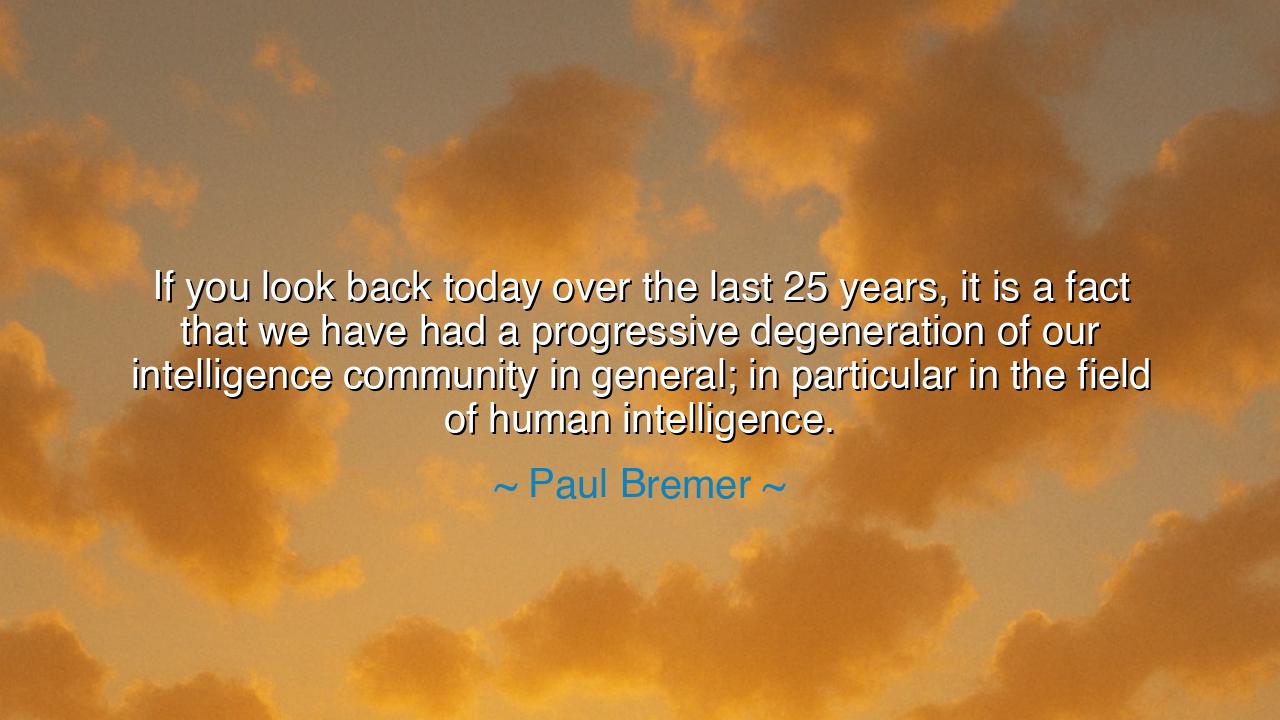
If you look back today over the last 25 years, it is a fact that
If you look back today over the last 25 years, it is a fact that we have had a progressive degeneration of our intelligence community in general; in particular in the field of human intelligence.






In the shadowed halls of power and secrecy, where nations guard their truths and whisper their fears, Paul Bremer, a man seasoned in the craft of diplomacy and intelligence, once declared: “If you look back today over the last 25 years, it is a fact that we have had a progressive degeneration of our intelligence community in general; in particular in the field of human intelligence.” These words, spoken not in anger but in lament, carry the weight of warning — that a nation’s greatest strength is not in machines or weapons, but in the living wisdom of those who understand the hearts and minds of men.
Bremer, who served as a diplomat and administrator during some of the most turbulent years of modern history, saw firsthand how the intelligence community — once guided by cunning, intuition, and human connection — had begun to drift toward abstraction. The rise of technology, satellites, algorithms, and surveillance had made information abundant but understanding scarce. His phrase “degeneration of human intelligence” was not an attack on knowledge itself, but a sorrowful reflection on how human insight, empathy, and direct experience had been overshadowed by the cold glow of data. In his voice one hears the echo of an ancient truth: that wisdom cannot be programmed, and no machine can truly replace the discerning spirit of a watchful human being.
The origin of his thought lies in the lessons of history. In times past, empires rose and fell not because of the strength of their armies, but because of the quality of their intelligence — and the wisdom with which it was used. During the Second World War, human agents, not machines, turned the tide of history. The codebreakers at Bletchley Park, yes, relied on technology, but it was the minds and instincts of people — Alan Turing and his comrades — that deciphered the enemy’s heart. In the Cold War, the most valuable intelligence was gathered not from satellites in orbit, but from human beings on the ground — the spies who risked everything for a fragment of truth. When Bremer speaks of degeneration, he speaks of a world forgetting this sacred craft — where strategy is born not from courage and observation, but from sterile analysis.
To understand this decline is to see how dependence on technology can dull the intuitive intelligence of the human spirit. In ancient times, generals like Sun Tzu and Alexander the Great knew that victory belonged to the one who understood not just the enemy’s movements, but his motivations — the fears, desires, and beliefs that moved men like currents beneath the sea. This was human intelligence in its purest form: the reading of hearts, not merely the interception of signals. Bremer’s lament is, therefore, the lament of a philosopher as much as a statesman — that in chasing efficiency, we have lost understanding; in gathering information, we have forgotten how to interpret it.
There is a story told of the Trojan War, of how the Greeks, unable to breach Troy’s walls with brute force, turned to deception — the crafting of the wooden horse. This act was not born of data, but of insight into human psychology. The Greeks knew that the Trojans’ pride would lead them to bring the horse inside their walls. Thus, through cunning and comprehension of the human heart, victory was achieved where violence had failed. This, too, is the lesson Bremer invokes — that human intelligence is not just the gathering of facts, but the wisdom to read the soul behind the fact, to see the unseen threads that bind action to motive.
But in the modern age, as Bremer warns, we risk losing this sacred art. We are surrounded by oceans of information yet thirst for understanding. We watch the world through lenses and screens, but fewer are those who step into the dust of foreign lands, who learn the language of strangers, who listen with both mind and heart. A nation, he reminds us, is only as strong as its ability to understand others — not through fear or numbers, but through compassion, patience, and the courage to see the world through another’s eyes. When that ability fades, no technology, however advanced, can save it.
Thus, let this teaching be passed down: Never let machines think for you. Use them as tools, but not as masters. Seek not only to know, but to understand. The degeneration of intelligence begins when curiosity dies and is replaced by arrogance — when we believe that knowing about a thing is the same as knowing it. Revive within yourself the old arts of attention, empathy, and discernment. In every field — whether in governance, in leadership, or in daily life — remember that the truest intelligence is not artificial, but human.
For in the end, Paul Bremer’s words are not simply about governments or spies, but about all of us. Each of us belongs to an intelligence community, for each of us must read the world around us and act with wisdom. Let us not degenerate into mere collectors of information, but rise as interpreters of truth. Let our intelligence not only affirm and deny, but seek to comprehend. For the greatest power of the mind is not its capacity to process data, but its ability to see the human story within it — and to act, always, with wisdom and compassion.






AAdministratorAdministrator
Welcome, honored guests. Please leave a comment, we will respond soon